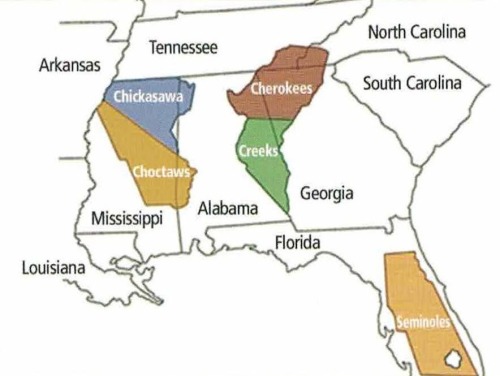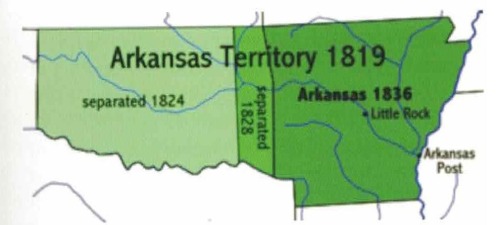
The Chickasaws
The power of this tribe, too, far exceeded its small numbers. The Chickasaws included at most forty-five hundred men, women, and children during the time of their southeastern residence and interaction with Europeans and white and black Americans. Like the Choctaws, Creeks, and Seminoles, the Chickasaws spoke a Muskhogean language. Their homeland included western Kentucky and Tennessee, northern Mississippi, and northwestern Alabama.
The Chickasaws were at least as closely related to the Choctaws as the Seminoles were to the Creeks. The Chickasaws and Choctaws formed a single tribe until sometime prior to Spaniard Hernando DeSoto’s 1540 discovery of them. The tribe’s very name probably means “they left as a tribe not a very great while ago.“ But the Chickasaws possessed a much keener commitment to the art of war than the Choctaws, and they were feared by the latter (despite the Choctaws’ numerical superiority), other tribes in their region, and even eventually Europe’s most powerful nations.
As Britain and France competed for control of North America-and in particular the lower Mississippi River and Valley and the Gulf ports to the south-in the early 1700s, the French cultivated the Choctaws as native allies, and the British did the same with the Chickasaws. So troublesome did the Chickasaws become to French efforts in the region, their governor of Louisiana declared in 1735 that the tribe’s “entire destruction … becomes every day more necessary to our interests and I am going to exert all diligence to accomplish it.”
From 1720 to 1763 several French armies marched into Chickasaw country from southern Louisiana and Mississippi to conquer the tribe. Choctaws, white militia, and black slaves supported the armies. All these efforts failed, and the tribe remained unvanquished when France surrendered its claims on the continent to the victorious British after losing the Seven Years War-including its North American theater, the French and Indian War-to them.
Horatio Cushman in his 1899 chronicle History of the Choctaw, Chickasaw, and Natchez Indians, noted how, contrary to the Chickasaws’ long conflict with the French European powers, “neither the Choctaws nor Chickasaws ever engaged in war against the American people, but always stood as their faithful allies.’
|
Read the entire Oklahoma story in John J. Dwyer's The Oklahomans: The Story of Oklahoma and Its People volume 1 of a 2-part series on the 46th state and the people who make this state very special. |

|
















 RSS Feed
RSS Feed
